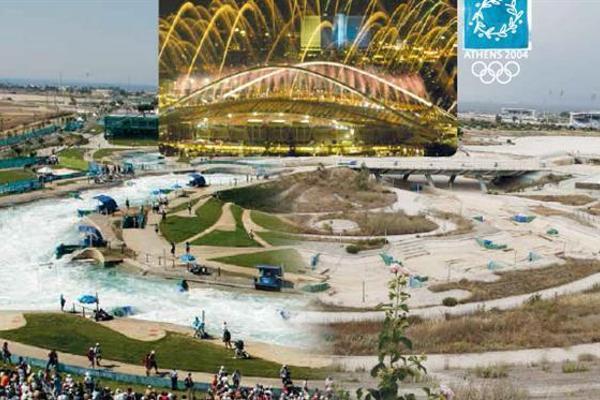Athens Olympics leave mixed legacy in the city
ATHENS - The Associated Press


The canoe/kayak venue at the former Helliniko Olympic complex was a great success during the Games, but is now totally abondoned. But the new subway line has improved daily life. AP photos
In an obscure corner of a park sits a forlorn reminder that, 10 years ago, Athens hosted the 2004 Summer Olympics. The crumbling miniature theater is inscribed with the words “glory, wealth, wisdom, victory, triumph, hero, labor” - and it is where visiting Olympic officials planted an olive sapling that would bear their names for posterity.Once a symbol of pomp, the marble theater is now an emblem of pointless waste in a venture that left a mixed legacy: a brand-new subway, airport and other vital infrastructure that significantly improved everyday life in a city of 4 million, set against scores of decrepit sports venues built in a mad rush to meet deadlines - with little thought for post-Olympic use.
As Greece groans under a cruel economic depression, questions linger of whether the Athens Games were too ambitious an undertaking for a weak economy. While economists agree it would be unfair to blame the meltdown on the 17-day Games, the post-Olympic era is seen as a decade of lost opportunities - including failure to significantly boost the country’s sporting culture. It’s a lesson to which Brazil may pay heed, as it races to complete projects ahead of the 2016 Olympics in Rio de Janeiro.
“We didn’t take advantage of this dynamic that we got in 2004,” said former Olympic weightlifting champion Pyrros Dimas, a Greek sporting hero turned Socialist member of Parliament. “We simply made the biggest mistake in our history: We switched off, locked up the stadiums, let them fall to pieces, and everything finished there.”
Overspending
“We spent a lot of money for some projects (that) are shut and rotting,” said Dimas, who won his last Olympic medal in an Athens arena now reinvented as a lecture and conference venue. “There were projects that should have cost 2 and 3 million (euros) and suddenly became so big that they cost 13 and 14 million. There was no control.”
The latest government estimate sets the final cost of the Games at 8.5 billion euros, double the original budget but a drop in the ocean of the country’s subsequent 320 billion-euro debt, which spun out of control after 2008.
Andrew Zimbalist, a U.S. economist who studies the financial impact of major sporting events, said past experience shows that hosting the Olympics does not generally promote economic development: “At the end of the day, the main benefit to be had seems to be a feel-good experience that the people in the host city or the host country have,” said Zimbalist, a professor of economics at Smith College. “But that’s a fleeting experience, not something that endures. Why couldn’t Athens have simply invested ... in development and transportation and communications and infrastructure, and not hosted the Olympics?”
Few of the sporting venues - mostly purpose-built permanent structures - have seen regular post-Olympic use. The badminton venue is a successful concert hall, but the empty table-tennis and gymnastics stadium is up for sale, and the beach volleyball center has been rarely used and was recently looted.
Most venues are padlocked.
The seaside site of Athens’ old airport hosted half a dozen venues. Politicians have dithered for a decade over how to use the sprawling plot - meaning facilities have simply been left to rot. Lengths of large tubing lie near abandoned runways. Decommissioned jumbo jets sit near where planners once dreamed of building a water amusement park. This year, private investors won a tender to develop the entire area into a residential, commercial, hotel and leisure center, in a 7 billion-euro investment.
Greek Olympic Committee head Spyros Capralos, a senior member of the 2004 organizing committee, said the state of the sporting venues “puts our country to shame.” The former swimming champion and two-time Olympic water polo competitor blames bureaucracy and lack of foresight.
“Nobody was thinking what would happen the next day,” he said. “Many of the sports facilities were constructed just to be constructed ... and nobody thought that they required a lot of money for maintenance after the Olympic Games.”
